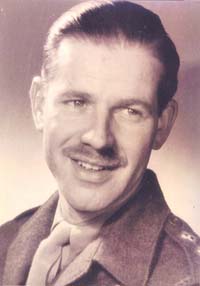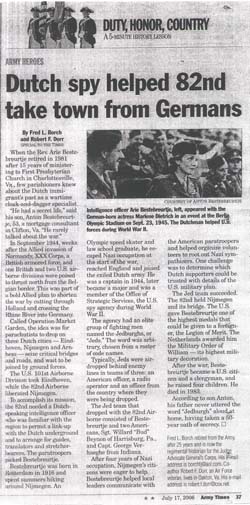Sobey Wall of Honour
Column
106
Row
1
Arie Dirk Bestebreurtje, born April, 1916 in Rotterdam, the Netherlands. Father, Anton D. Bestebreurtje moved the family to Zurich, Switzerland in the early 30's because of a job transfer.
Arie was an alternate on the Dutch speed skating team at the 1936 Olympics. He did not compete.
Arie graduated from the University of Zurich with a law degree in 1940. He married Gertrude M. Bersch, born in 1915 in Sydney, Australia, the same year.
With the start of World War II the family left Switzerland, and made it to England via Portugal. Anton, his wife, and their three daughters, continued on to New York.
Arie and his bride remained in England. He enlisted in the Dutch army, trained by the British army in Ontario. Because of his schooling, physical aptitude, and a command of several European languages, he volunteered for the OSS. He became a Jedburgh, a group of fewer than 300 men within the OSS. Their job was to drop in teams of 3 into occupied Europe, and later Asia. They coordinated with the local resistance to harass the enemy with a strength that far exceeded their number. Arie jumped three times into his native Holland. The first two were in the Nijmegen area, partially depicted in the movie 'The Bridge Too Far'. His final jump was near Assen. Bad weather forced his team into, rather than outside, a German camp for transporting Jews from Holland to the concentration camps. With his team all captured or killed, Arie, with a broken foot, was able to crawl under the fence after 4 days inside, where he was rescued by Mr. Schutten, who farmed the land adjoining the camp. Schutten risked his family's life to hide this Dutch paratrooper.
Having survived the war, Arie's exploits were recognized by the governments of the US, Britain, and France, each of whom awarded him the highest decoration given to a non-native. He also received the Dutch Medal of Honour.
In 1946 he came to New York, rejoining his wife and young daughter, who had been born in 1943 during the Blitz. More children followed - another daughter in 1948, a son in 1953, and another daughter in 1954.
By 1954 Arie could have been well on his way to a lucrative law career. A bona fide war hero with a top flight degree in International Law could have made a killing helping to rebuild Europe but he had enough of killing. The experiences of 5 years of war convinced him to take a different path. He entered union Theological Seminary in New York, becoming a Presbyterian minister in 1953. After a brief apprenticeship with a church in the New York area, he took over a new church in Louisville, Kentucky. Ten years later it was the largest Presbyterian Church in the state, whereupon he moved to Charlottesville, Virginia. He served as the head pastor there until his retirement 15 years later in 1981. One year after retirement, he drowned while ice skating. His wife Gertrude died in 2000.
In the U.S., he is survived by his 4 children, and two granddaughters. In Holland there are scores of family members on both sides of his family. His wife's immediate family is still in Switzerland with distant cousins in Australia and New Zealand.
***
Rescue Story - Holland, April 12 1945
We in Holland were occupied by the Germans for five long years. Many terrible things have taken place in that period of time. I cannot go into details, but one matter I would like to explain to you today if I may.
Hitler in WWII was a dictator who wanted to have complete control of the world, a world dictator. He won the election, and after that look out; he became an evil person who hated the Jews, Christians, Gypsies, and used the concentration camp to get rid of what he called 'the undesirables'.
Before the war, many Jews fled after Crystal Night to Holland. The Dutch government made a Jewish camp called Kamp Westerbork which was a good place to stay; and see what is going to happen in Germany; and many things did take place - Germany became too powerful. (I am not going into details).
During the war the Dutch with Radio Orange, operating from England became a resistance group who operated in secret. They helped the Jews and moved weapons and helped with airplane weapons droppings, they also killed and were killed if caught.
Our parents belonged to that and had dangerous work to do, especially during the last year of the war; it was called the hunger winter. They also kept people in hiding that had to go to Germany to avoid concentration camps, but Hitler killed millions just the same. This is an introduction but now I go to my rescue story of Captain A. Bestebreurtje. I will call him Capt. B. in my story which is a true story.
Capt. B. belonged to the American Army and had fought in Normandy. The Longest Day, and in the Market Gardening Attack, called in the film "A Bridge Too Far", and later on in the northern part of Holland to free Kamp Westerbork and to stop the last train load of Jews to be brought to the gas chamber. My father's farm was close to Kamp Westerbork and I brought food for the kitchen weekly, but daily Jews were collected in Holland and brought to the barracks, and weekly they were going with the train to the gas chambers in Germany. Kamp Westerbork was a collecting camp, before they were going to the killing gas chambers.
Via the resistance we knew that the Allies were coming to free Kamp Westerbork. The watch word for this operation was Utrecht. War is never tidy and very hard to understand sometimes. The night from April 9 1945 was a terrible night, a real war night, fighting on land and in the air.
But on April 11 1945 my dad said that we had to sort our potatoes to have seed potatoes for planting; because the Germans were coming and take all our potatoes to feed the Germans home. The war was getting more dangerous and in the afternoon of that day we went home early from the field, but my brother Herman took a longer way home for some reason, and came by a straw hut and heard somebody jell, and it turned out to be the parachute jumper Capt. B. who had a broken leg. He was in need of help, and he asked my brother for food and drink in Dutch.
Who would have even thought that was possible, asking in Dutch. (Capt. B. was born in Holland, his parents immigrated to the U.S.A. He studied and became a lawyer, he was a student in Berlin before the war. He even found his dear wife at the university in Berlin. Capt. B. spoke German, Dutch, English and when entered the army he was already an international lawyer. No small wonder that they made him Capt.).
At night after my brother told dad who he talked with, my dad went out and brought food and drink, but before they became friends my dad asked for a watch word, and after he said "Utrecht" they became real friends, and dad told him that "tomorrow we will pick you up, you need help, you cannot stay here".
April 12 1945. Our household was nervous, the war and fighting was getting worse, but we had a job to do, dad promised to pick up Capt. B. with his broken leg. We put a horse in front of a wagon and a box on the wagon, a pair of pitchforks, and away we went to the straw hut, pretending it was manure we were loading. When we saw a clear moment we put the wounded soldier in the box and kept on loading. He was in the box and could see the soldiers; the German soldiers must have for sure thought "that farmer is nuts". Good thing that they did not know what we had under the manure.
We had a precious load to take home, and to take care of. When we took Capt. B. in the house, we took his clothes and gun and put it in a box in the ground for safety's sake. We also had two R.N. nurses hiding in the house, and they took care of his broken leg. Capt. B. spoke good Dutch and he asked what is the date today, and my mother said April 12, 1945, and he replied: "Today is my birthday, and what a great present did I receive by being here". We had a double feast day for sure. He also said, "I prayed a lot for help, because I was worried". My mother replied, "We have to pray for God's guidance always, not only if we think we need help".
The next day however, the sirens went on and the Germans with their helpers came through the house, and took what they liked; but God saved Capt. B. and us all by not finding him. He was standing in the corner of a walk-in closet with some junk in front of him. That same night the war was far enough advanced that we would be free. Razzia in the morning and free in the evening. The same evening we went to town to celebrate, but also to give the Red Cross a note to help Capt. B. with his broken leg.
The following day we thought that the Germans were back because a German Red Cross tank had come in the yard. This was not the case; the captured German had to help pick up the wounded and the dead soldiers. To free our little town took five allied soldiers; and many German soldiers were killed, but the Red Cross tank also brought coffee, chocolate, candy, sugar, real bread and the works. We had not seen the real stuff for years, the Germans took everything for their so-called 'Homeland'.
My mother could finally make real coffee again, but she also said the German driver is not going to get any, but Capt. B.'s reply was: "He will have coffee too, because he did his duty".
Capt. B. left after many good-byes and farewells, and he promised he would write us sometime about his family in the U.S.A.
The day after his pick up another scare; and allied plane flew over the farm and dropped something. It turned out to be my Father's old slipper that had been on his broken leg still. The pilot made a waving move when he flew away to say a final good-bye.
This real story took place in Holland in April 1945, the last year of the war.
But the real part of the story is that we still have contact with the Bestebreurtje family in the U.S.A. Visits back and forth are still being made as of today; and the Bestebreurtje family visit Holland as well.

